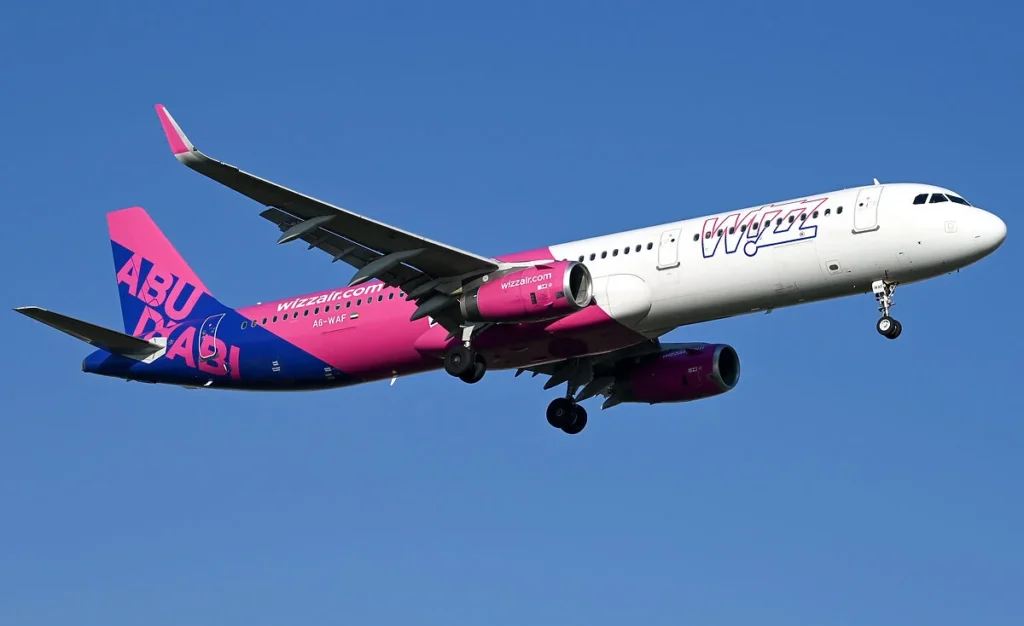In a move that has caught many regional travellers and industry insiders off guard, Wizz Air has officially confirmed plans to exit its Abu Dhabi operations. The low-cost European airline, which had become a familiar name in the UAE’s budget travel scene, is preparing to wrap up all its services in the capital after a five-year run.
The announcement marks the end of what was once seen as a bold and strategic push into the Gulf aviation market — a region known for its competitive air travel industry and growing appetite for low-cost, efficient flying options.
A Short Yet Eventful Journey in the UAE Skies
When Wizz Air first arrived in Abu Dhabi, it was celebrated as a welcome disruptor. The airline was offering ultra-low fares, linking the UAE’s capital with popular destinations across Central and Eastern Europe, South Asia, and the Middle East. It appealed to both budget-conscious leisure travellers and the region’s massive expatriate community who craved affordable, direct connections to their hometowns.

Wizz Air Abu Dhabi began its journey with high hopes, aiming to carve out a solid share in the competitive Gulf market dominated by regional heavyweights like Emirates, Etihad, and Air Arabia. The timing seemed perfect, with a growing number of residents and tourists seeking budget travel options, especially after the pandemic opened up opportunities for leaner, cost-effective airlines to thrive.
Its distinctive magenta and white aircraft quickly became a regular sight at Abu Dhabi International Airport, and within a short span, the airline expanded its route network, connecting the UAE to destinations like Athens, Baku, Sarajevo, and Kutaisi, among others.


Rising Challenges in an Intensely Competitive Market
Despite its promising start and rapid expansion, Wizz Air faced significant headwinds as it tried to maintain its operations in a highly competitive market. The Gulf region, while lucrative, is dominated by several established players with deep financial backing, strong brand loyalty, and extensive regional and international networks.
Wizz Air’s low-cost model, which had seen tremendous success in Europe, proved more challenging to sustain in the Gulf. Operational costs, regulatory constraints, and stiff competition from local airlines offering competitive fares and wider route options made it difficult for the airline to achieve the scale it had envisioned.
Additionally, fluctuations in travel demand, changing passenger preferences, and the evolving dynamics of post-pandemic air travel further complicated its ability to maintain consistent profitability in the region.
The Official Announcement and What It Means
Wizz Air recently made its official announcement to cease Abu Dhabi operations, confirming that all flights would come to an end by September. The decision wasn’t entirely unexpected within aviation circles, as rumours about the airline reevaluating its Gulf presence had been circulating for months.
For regular passengers and loyal travellers, the news comes as a disappointment. Many relied on Wizz Air for affordable and direct travel options that weren’t always available through other regional carriers. The airline had become a preferred choice for budget-conscious travellers visiting family abroad or seeking last-minute holiday getaways without breaking the bank.
As part of the wind-down process, the airline has assured affected passengers that they will be offered suitable alternatives, including refunds or the option to rebook through other partner carriers. Customer service teams have reportedly been mobilised to assist travellers in adjusting their plans and managing any disruptions caused by the sudden exit.
What Led to This Decision?
While Wizz Air has cited strategic business reasons for its withdrawal from Abu Dhabi, aviation experts suggest several contributing factors that likely influenced the move.
One of the main challenges was the operational costs associated with maintaining a base in Abu Dhabi, especially in a market where established regional competitors already dominate key routes. While Wizz Air tried to position itself as an ultra-low-cost alternative, pricing wars and route overlaps with airlines like Air Arabia Abu Dhabi and flydubai made it difficult to maintain sustainable margins.
Furthermore, changes in consumer travel patterns, particularly after the pandemic, meant that demand on certain routes failed to reach pre-pandemic levels, while others faced intense competition. Coupled with rising fuel prices and operational costs globally, Wizz Air’s business model faced mounting pressure.
The decision to exit Abu Dhabi is also believed to be part of a wider restructuring strategy, allowing the airline to refocus resources on its core European operations and other high-potential markets where profitability and demand are more predictable.

Impact on UAE’s Budget Airline Landscape
Wizz Air’s departure will certainly reshape the budget airline sector in the UAE, especially in Abu Dhabi, where the airline had served as a key player for travellers seeking affordable international flights. Its exit leaves a noticeable gap in the market, though other low-cost carriers are expected to step in to fill the void.
Air Arabia Abu Dhabi, for example, is already well-positioned to absorb much of the demand left behind by Wizz Air, with plans reportedly underway to expand its route network. Flydubai, too, continues to grow its footprint, offering budget-friendly options from Dubai International Airport to various regional and international destinations.
For passengers, this means a likely recalibration of options, with some destinations potentially becoming less accessible or more expensive due to reduced competition. However, the overall demand for budget travel in the UAE remains strong, and new entrants or expanded services from existing players could offset the impact in the near future.
Lessons for Future Market Entrants
Wizz Air’s story in Abu Dhabi offers valuable lessons for other international carriers considering entry into the Gulf market. While the region presents immense potential due to its strategic location, affluent expatriate population, and thriving tourism sector, it also comes with unique challenges.
The presence of well-established, government-backed carriers, stringent regulatory environments, and high operational costs make it essential for new entrants to develop highly adaptive business models and carefully curated route strategies. Simply replicating successful models from other regions without local customisation can lead to operational hurdles and financial strain.
Additionally, the need to quickly achieve scale and establish brand loyalty in a competitive market dominated by household names cannot be underestimated.
What’s Next for Wizz Air?
Though Wizz Air is exiting Abu Dhabi, the airline continues to operate across other markets, maintaining its position as one of Europe’s leading low-cost carriers. The move is part of a broader effort to streamline operations and concentrate resources in regions where growth opportunities are more sustainable.
Wizz Air remains committed to its core mission of making travel accessible and affordable, with plans to expand its European route network and explore new market opportunities that align better with its business model.
For its loyal travellers in the Gulf, the exit may be disappointing, but it’s not necessarily the end of Wizz Air’s story in the region. The airline has hinted at the possibility of revisiting regional opportunities in the future, should market conditions evolve and operational dynamics become more favourable.

Final Thoughts
The departure of Wizz Air from Abu Dhabi marks the end of a short but impactful chapter in the UAE’s aviation history. It serves as a reminder of the region’s complex market dynamics and the importance of adaptability in the fast-paced airline industry.
While travellers will miss the budget-friendly options Wizz Air once offered, the UAE’s aviation sector remains robust and dynamic, with other players poised to step in and ensure continued connectivity for residents and visitors alike.
As the Gulf region continues to attract travellers from around the world, opportunities for innovative, efficient, and customer-centric airlines will undoubtedly emerge. And for Wizz Air, this chapter’s closure might just be a strategic pause, not a final goodbye.
Do follow UAE Stories on Instagram













